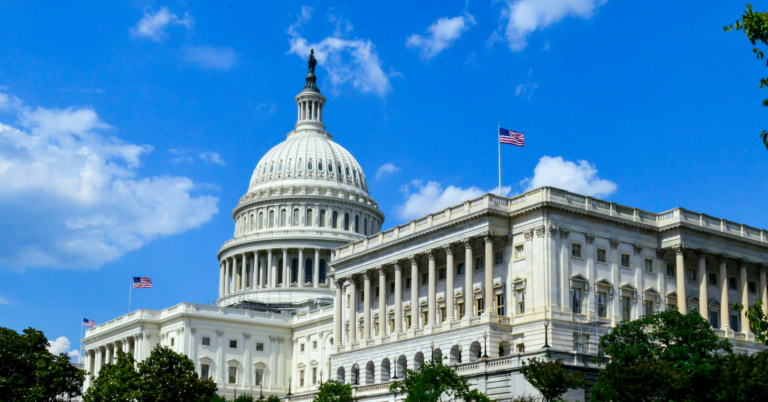
The GAIN AI Act, short for Guaranteeing Access and Innovation for National Artificial Intelligence Act, sounds like the kind of bill that would strengthen America’s lead in technology. In reality, it could do the opposite.
The proposal would require advanced AI chip manufacturers to fill domestic orders first before exporting to other countries. On paper, that might look like a smart way to secure supply chains and keep U.S. firms ahead in the global AI race. But in practice, it’s a recipe for more red tape, less innovation, and slower growth that will hinder U.S. companies from setting the global standards in AI development and set back building relationships with allies abroad.
In other words: The GAIN AI Act takes us backward. It is protectionism dressed up as national security. At Americans for Prosperity, we believe the best way to strengthen America’s competitiveness is through freedom and open markets, not government micromanagement.
A Bureaucratic Nightmare in the Making
The bill creates new export control systems that give more power to government agencies and unelected bureaucrats, as well as private petitioners, to block chip exports. That means more bureaucracy, more paperwork, and more chances for political interference.
History has shown that once government starts picking winners and losers, innovation slows, costs rise, and consumers lose. America should instead free our innovators to compete globally.
Competition, Not Control, Drives Progress
Closing the door to international markets doesn’t make a country stronger, it makes it slower and less efficient. The GAIN AI Act would force companies to meet domestic quotas before they can export, punishing firms that have built a global customer base.
The semiconductor industry is characterized by extremely high fixed costs and relatively low marginal costs. Developing and producing the first chip demands billions in investment, whereas manufacturing each additional chip is far less expensive. This economic structure is central to the global debate over export restrictions. If U.S. companies are prevented from accessing international markets, they stand to lose a vital and profitable revenue stream, one that is crucial for funding research and development of next-generation chip technologies.
According to the Semiconductor Industry Association the proposal would expand controls on technologies not currently subject to a license requirement, like those for gaming consoles, and further extend restrictions to more than 140 new countries with the effect of controlling allocations and shipping schedules for commercial, off-the-shelf products.
That’s not how you win the race in artificial intelligence. You win by encouraging competition, not by tying your best players’ hands. When businesses face global competition, they innovate faster. When they face bureaucratic limits, they stagnate.
Finding new clients after exports are halted takes time. This can lead to lost revenue and jobs, not to mention time and future talent. American firms previously subject to export controls struggled to establish relationships in domestic or politically aligned markets, resulting in a $130 billion decline in market capitalization.
The Global Consequences
Yes, China cannot currently produce top-tier AI chips. But that won’t last forever. Just as Huawei built world-class 5G networks, Chinese firms are investing heavily to catch up in AI.
If the U.S. shuts its own companies out of global markets, others will fill the gap and we will have less influence in those spaces. The best way to secure our advantage is to free American companies to lead, selling their products, shaping global standards, and building trusted relationships with partners abroad.
When countries build their own data centers or AI infrastructure, it’s far better they do so with American chips.
Export controls can spur innovation in the targeted countries. Directly affected firms increased their R&D expenditures, patenting, and active inventors – having domestic suppliers more than quadrupled innovation in technologies related to restrictions. According to research estimates, patenting activity in related technologies grew by 65.1%, and patents in unrelated fields increased by 41.6%, reflecting a wide-ranging innovation response rather than a narrow effort to replace restricted components.
Hurting Both Business and Government
The GAIN AI Act wouldn’t just hurt American innovation and companies; it would also harm taxpayers. Nvidia’s H20 chip, a lighter version of its flagship, is already limited by export rules. Expanding those restrictions means less revenue for firms and less tax income for the federal government.
According to research from the Federal Reserve Bank of New York, U.S. firms experienced an average 2.5 percent drop in stock value when their Chinese customers were subjected to export restrictions. Also, with reductions in profitability, employment, and bank lending.
Every dollar in overseas sales is an additional dollar U.S. firms can invest in innovation, and one less dollar in the hands of their global competitors.
That’s fewer dollars for innovation, fewer American jobs, and less fuel for the economy, all because of a misguided attempt to “protect” something that does no’t need protecting.
A Better Way Forward
If policymakers truly want to strengthen America’s AI leadership, they should focus on removing barriers, not adding them. That means:
America didn’t lead the world in technology by creating more regulation but by embracing innovation, openness, and competition.
The Bottom Line
The GAIN AI Act may sound patriotic, but it’s the wrong way to safeguard America’s innovative edge. Handing more power to bureaucrats and limiting competition would only slow the progress it claims to protect. True leadership doesn’t come from restricting success; it comes from unleashing it. To ensure continued innovation and lasting prosperity, we must remain the world’s most competitive nation.
Mario Ottero is a technology & innovation policy analyst at Americans for Prosperity.
© 2026 AMERICANS FOR PROSPERITY. ALL RIGHTS RESERVED. | PRIVACY POLICY
Receive email alerts to learn how to get involved